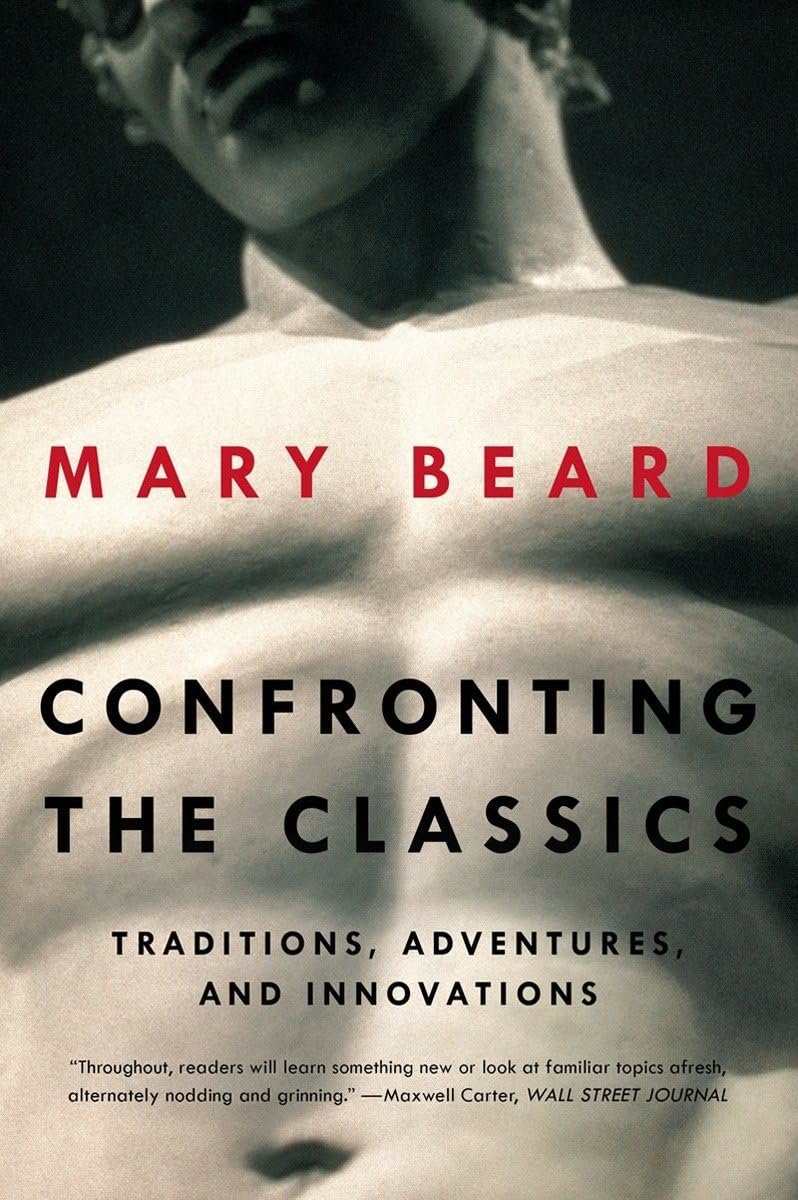Book Review: Confronting the Classics
/Confronting the Classics: Traditions, Adventures and Innovations
By Mary Beard
Liveright, 2013
Renowned classicist Mary Beard, in a recent TLS piece about the extent to which ancient Roman contiones signified any kind of working democratic principles, assumed the role of referee, warning, “It is not a bad rule of thumb in modern ancient history writing that the more space the footnotes occupy, the less likely they are to prove what they are supposed to.” Another good rule of thumb, she adds: “the more cod Latin that is sprinkled over any discussion of Roman history, the less well founded the argument is likely to be.”
It’s carefully-chosen ground, and it’s Beard’s home patch: scholarly enough to keep scholars on their toes, but also populist enough to decry excessive footnotes (and to mischaracterize their purpose in the process, since only fussy academics will object to that) and cod Latin. In the wonderful opening piece of her latest collection of occasional prose, Confronting the Classics, Beard lays out the rough outline of her “manifesto,” in remarks originally given as the Robert Silvers lecture at the New York Public Library in 2011, and the book’s title echoes the lecture’s key line: “Classical tradition is something to be engaged with, and sparred against, not merely replicated and mouthed.”
That “sparred against” is the guiding note of Confronting the Classics – though delightful and funny in person (and on her justly-praised blog A Don’s Life), Beard is an unfailingly pugnacious reviewer who can spot a book’s besetting weakness as quick as boiled asparagus and who’s not afraid to pounce when pouncing is in order. She provides new integumentary prose stitching together her book’s five sections, the end product could just as accurately have been called Confronting the Classicists; the dozens of pieces collected here (so much handier than a folder full of yellowing New York Review of Books clippings) scold, chastise, mock, and sometimes – though this is rare in a writer of Beard’s basically knockabout sensibilities – condescend, especially if the object has the nerve not to be a professional classicist at all. In such cases – as when she reviews journalist Stacey Schiff’s best-selling biography of Cleopatra – Beard can sound almost like Lady Bracknell, alert for signs of triviality:
Schiff’s approach to the story of Cleopatra is, in part, skeptical and businesslike. She has a refreshing, outsider’s perspective on this period of Mediterranean history, and plenty of pithy phrases to match. Occasionally, these bons mots come rather too thick and fast for my taste. But her summary of the atmosphere in Rome after the assassination of Julius Caesar (‘a lively market opened for defamation and self-justification. There was a run on self-congratulation’) captures the politics of the period more aptly than the many pages written by specialist historians; and she gets Roman ambivalences toward extravagance exactly right when she observes that ‘luxury is more easily denounced than denied.’
Readers who might not like having scraps of books quoted back at them piecemeal will stumble right away over the only real weakness of Confronting the Classics: it’s a collection of book reviews, and without significant re-shaping, book reviews will always read as though their author were reviewing some sort of book or other. There’ll always be some stale echoes of “Ferguson writes,” “Ferguson maintains,” “Ferguson may have overstepped the mark.” Readers who haven’t read the books under review (perhaps the majority in cases like Bilingualism and the Latin Language) will sometimes feel like their eavesdropping on a heated argument in a foreign language.
It’s a weakness that can’t be avoided in a collection like this. The only way to avoid it is by never writing that kind of book review in the first place, and that’s tough for any working freelancer to manage on a regular basis (it helps to have either a trusting editor or an oblivious one). The delightful thing about Beard is how often she does manage it, including most often where it’s least often done, in the multi-book omnibus review. When Beard is analyzing three or four books on a related topic at the same time, the fettle and dash of her prose increase in strides, and insights start winging about. When she reviews a bunch of books on Alexander the Great, for instance (including Philip Freeman’s Alexander the Great, James Romm’s edition of Pamela Mensch’s The Landmark Arrian, and James Romm’sGhost on the Throne), she’s better company than any of them:
Roman writers did not merely debate the character of Alexander, they did not merely take him as a model, they more or less invented the ‘Alexander’ that we now know … In fact, the first attested use of the title ‘Alexander the Great’ is in a Roman comedy by Plautus, in the early second century BC, about 150 years after Alexander’s death. I very much doubt that Plautus himself dreamed up the term, but it may well have been a Roman coinage; there is certainly nothing whatever to suggest that Alexander’s contemporaries or immediate successors in Greece ever called him ‘Alexander ho Megas’. In a sense, ‘Alexander the Great’ is as much a Roman creation as ‘Pompey the Great’ was.
We need classical critics like this (and if we must take them with their names and book-titles sprayed across the pecs and abs of a gorgeous Praxiteles, we’ll just have to close our eyes and think of England), sparring against the new histories of the day, teaching and admonishing and sometimes praising. Reviews, Beard tells us, “are a crucial part of the ongoing debate that makes a book worth writing and publishing; and they are a way of opening up the conversation that it provokes to a much wider audience.”
Confronting the Classics deserves that much wider audience. It’s a feisty, engaging volume, bringing to life an entire field of literature that can use as many champion explainers as it can get.

